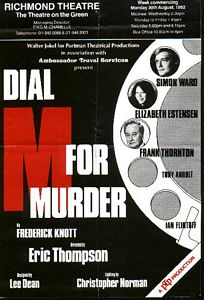DIAL M FOR MURDER by Frederick Knott
Venue: Richmond 1982
Directed by Eric Thompson

Cast
Tony Wendice
Simon Ward
Sheila Wendice
Elizabeth Estensen
Inspector Hubbard
Frank Thornton
Max Halliday
Tony Anholt
Ian Flintoff
Review
Frederick Knott’s thriller must be familiar to almost everyone in the land, thanks to the late Alfred Hitchcock and TV. Seeing the film recently on television it struck me as incredibly contrived and poorly acted in equal proportion by the major stars of the day. It also seemed overlong; being the late night movie it was difficult to stay awake, and yet so intriguing were the convolutions of the plot that effort had to be made.
Back in its original frame, the theatre, for which it was designed in the fifties, Dial M proves a pleasant surprise, although it is dated in the acceptably nostalgic way that, say, Agatha Christie is dated. However this straightforward no-nonsense production by Eric Thompson is intriguing throughout, even to those of us who remember every plot twist so well. For all its plot, from the beginning to end, and the characters are mere pawns on the author’s chessboard. The ex-tennis star husband, Tony Wendice, living on his rich wife Sheila’s money, evolves a complicated scheme to murder her; his old school mate, the vital catalyst in the game and as obvious a puppet as ever devised by playwright; Sheila’s lover, Max Halliday, who of course writes murder stories for a living—all are marionettes, with no raison d’être but to perform the essential moves on the board.
Yet the cast is accomplished enough top give these charters a semblance of humanity. Simon Ward, his bewildered schoolboy look serving admirably to smooth over the incongruities in the monster of duplicity he is called on to play, carries us along with him, so that we are mostly on his side. Elizabeth Estensen does well, although the denouement and its interpretation would have defeated Flora Robson at her peak. Tony Anholt’s dark good looks and incisive acting effectively fill the vacuum that is Max Halliday. Guiding them all gently towards their destiny is Frank Thornton’s Inspector Hubbard, a beautifully understated and totally convincing characterisation. An intriguing conundrum.